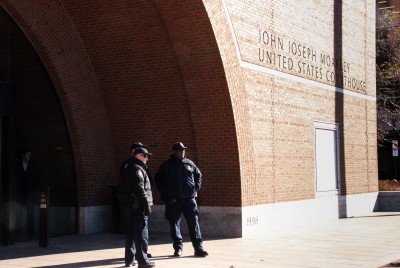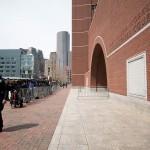
Jury selection for the trial of Boston Marathon bombing suspect Dzhokhar Tsarnaev began Monday at the John Joseph Moakley United States Courthouse, despite a recent attempt from Tsarnaev’s defense team to delay the trial.
Tsarnaev is accused of placing two bombs at the finish line of the Boston Marathon that killed three people and injured more than 260 on April 15, 2013. The 21-year-old suspect has pleaded not guilty to the 30 federal counts against him.
Tsarnaev and his older brother, Tamerlan, are also accused of killing Massachusetts Institute of Technology police officer Sean Collier three days after the bombings while running from police.
Tamerlan was killed in a police shootout in Watertown on April 19, four days after the marathon. The younger Tsarnaev was taken into custody that night after avoiding police for nearly 24 hours.
In the days following Tsarnaev’s arrest, several members of the U.S. Congress sought to give the suspect limited civil liberties in his trial. On April 21, U.S. Sens. Lindsey Graham of North Carolina, John McCain of Arizona and Kelly Ayotte of New Hampshire, as well as U.S. Rep. Peter King of New York asked U.S. President Barack Obama to consider Tsarnaev a public enemy, taking away his right to be read his Miranda rights or be appointed a counsel, the Daily Free Press reported.
U.S. Attorney Gen. Eric Holder announced April 22 that Tsarnaev would be charged with with one count of using and conspiring to use a weapon of mass destruction and one count of malicious destruction of property by means of an explosive device resulting in death, the FreeP reported.
On May 1, three men were arrested and charged for impeding the process of the investigation.
Azamat Tazhayakov and Dias Kadyrbayev, who were classmates of Tsarnaev at the University of Massachusetts Dartmouth, were charged for willfully conspiring with each other in offense against the United States and for destroying and concealing evidence by plotting to dispose of a laptop and a backpack containing fireworks belonging to Tsarnaev, the FreeP reported.
The third man, Robel Phillipos, was charged with knowingly and willingly making false statements to federal officials during the investigation.
In June, state and federal prosecutors formally charged Tsarnaev with a 30-count indictment that included weapons of mass-destruction, car-jacking, illegal use of a firearm during a violent crime and killing four people, the FreeP reported.
Tsarnaev’s lawyers appeared in court late September to request more time to decide whether the death penalty should be used in this case. Although the death penalty is illegal in Massachusetts, it is an option for Tsarnaev because his trial is in a federal court. The lawyers argued that because the prosecution had yet to present all of their evidence, it was difficult to build a defense. The request was denied, the FreeP reported.
Holder announced in January 2014 that the United States will be seeking the death penalty in the trial, the FreeP reported.
A Quincy cab driver was charged for obstructing the investigation of the bombings in May. Khairullozhon Matanov was charged with one count of destroying, altering and falsifying records, documents and tangible objects in a federal investigation and three counts of making a materially false, fictitious and fraudulent statement in a federal investigation involving international and domestic terrorism. After the bombings, he took the Tsarnaev brothers out to dinner and continued to contact them.
Matanov allegedly did not know that the brothers were the bombing suspects until their photos were released. However, he provided information to law enforcement that he intended to be “misleading,” the FreeP reported.
On June 18, Tsarnaev’s defense team requested a change of venue for the trial, arguing that it would be nearly impossible for an impartial jury to be found in Massachusetts, the FreeP reported. U.S. Federal District Court Judge George A. O’Toole Jr. denied the request. The defense also filed a request for postponement, which was granted, moving the initial November 2014 trail start date to January 2015.
Tsarnaev’s team submitted another request Wednesday to once again postpone the trial, but it was denied.
Paul Gugliuzza, an associate professor of law at Boston University’s School of Law, said Tsarnaev’s trial will be a long and complex one.
“The stakes could not be higher, so both sides will be meticulous in their presentations,” he said in an email. “More than anything, his objective will likely be to avoid the death penalty.”
Because the charge carries the death penalty, the jury must unanimously agree to convict him, he said. Then, in a second phase of the trial, they must unanimously vote to impose it, he said.
“It’s rare for the federal government to seek the death penalty, but it’s not unprecedented,” he said. “What’s unusual in this case is that the federal government is seeking to impose the death penalty in a state that does not have the death penalty.”




